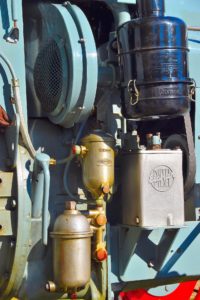It's the middle of summer and your diesel engine is having trouble getting started. The problems that can occur due to the cold weather are well-known and fairly common, such as using summer-grade fuel in winter, a bad glow plug system, slow cranking, or thick, cold oil.
However, in summer the problems tend to be quite different. Here are a few different issues to consider if your diesel is a hard start.
Issues with Fuel Delivery
There are quite a few different issues to check for if you suspect fuel delivery is the issue.
- Check using a scan tool to determine whether injector timing is correct.
- Check for air in the fuel. This is an especially likely culprit if the engine dies
 shortly after it starts, and then is difficult to restart. Leaks in the fuel lines or pump can allow air into the system.
shortly after it starts, and then is difficult to restart. Leaks in the fuel lines or pump can allow air into the system. - Clogged fuel filters. Fuel filters generally need to be changed every 20,000-40,000 miles, so if they haven't been changed recently, you may want to try this first.
- If the issue isn't solved with a new fuel filter and you have noticed the problem worsening gradually on a higher-mileage vehicle, it may be time to replace the pump. If the vehicle won't start at all, listen for a clicking noise when you turn the ignition switch on. If the click is missing, the likely problem is the solenoid. On the other hand, if you hear a click but no fuel is pushed through the injector lines, and nothing is clogging the lines, it's time to replace the pump.
Issues with Injectors
The pressure in a diesel injector is generally quite high compared with gasoline engines, but the pressure can decrease over time. You can test the opening pressure of the injectors to see if it is too low or too high, since either way could be problematic.
If you notice a rough idle, loss of power, and white smoke in the exhaust on occasion, your injectors might be dirty. If you notice black smoke in the exhaust, a leaky injector is likely. You can check the temperatures of the cylinders, or the resistance of the glow plugs (which increases with increasing temperature), to determine whether your injectors are bad.
Contaminated Fuel
Unlike gasoline, diesel fuel can be an ideal environment for some bacteria. The warmer the temperatures outside, the better and faster the bacteria grows. If you notice a sulfuric odor or a black or green coating in the fuel tank, this is the most likely culprit for a gummed up fuel system. To get rid of it, you'll need to drain and clean the fuel tank, using a biocide to clean. If other parts of the system, such as the fuel lines or injection pump, are contaminated, you'll need to clean them, as well. When you refill the fuel tank, add a bit more biocide to prevent the bacteria from returning.
Getting a Second Opinion
Some causes of hard starts are cheap and simple fixes, like replacing filters. Others can be time-consuming and could be expensive. To be sure you've found the problem and to be sure it is fixed properly, ask the experts at All in the Wrist Auto and Diesel Repair. Their certified diesel specialists can help with all of your diesel maintenance and repair needs.








